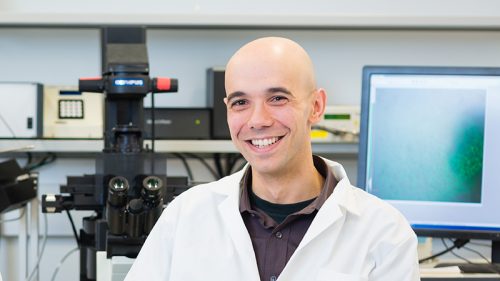
Professor Rodrigo Fernandez-Gonzalez (IBBME) has commenced a five-year term as the chair of the EngSci biomedical systems engineering major, succeeding Professor Dawn Kilkenny (IBBME).
In his Quantitative Morphogenesis Laboratory, Fernandez-Gonzalez leads a group of researchers focused on one of the outstanding questions in biology: how do cells “talk” to each other to coordinate their behaviour?
For example, when our bodies are injured, groups of cells must work together to form new tissue and close the wound. By studying wound repair in fruit fly embryos, Fernandez-Gonzalez and his team are trying to understand the underlying mechanisms of cell communication during tissue repair. Their work could help find ways to promote or prevent cell communication, leading to new drugs or therapies that help wounds heal faster or prevent tumour metastases.
Fernandez-Gonzalez is an Associate Professor in the Institute of Biomaterials & Biomedical Engineering, the Department of Cell and Systems Biology, and the Ted Rogers Centre for Heart Research at the University of Toronto, and the Developmental and Stem Cell Biology Program at Sick Kids. He received the Early Researcher Award from the Ontario Ministry of Research and Innovation in 2015, and the Tier II Canada Research Chair in Quantitative Cell Biology and Morphogenesis.
We asked him about his vision for the next five years.
What are your thoughts on biomedical systems engineering (BSE) major?
Over the last four years, I have had the privilege of teaching EngSci students. I have been most impressed with their ability to learn and connect concepts from the different courses they take. What strikes me about students in the BSE major in particular is their desire to make a difference in the fields of biology/medicine.
What do you hope students get out of it?
I am hoping they learn about biology and medicine, and how with their quantitative skills, they can contribute to these fields in truly unique ways. The tools and approaches that BSE students bring to the table and contribute to develop are now central to the study of biological systems.
I see it every day in my research field: when I did my PhD and postdoctoral work, it was rare for me to find other engineers at conferences. These days, engineers, physicists, and mathematicians are part of every major research team; and professional societies, such as the American Society for Cell Biology, organize entire sessions and tracks in their meetings to attract people with quantitative skills.
What are your goals for the major?
I want to enhance the student experience. I am a big fan of the BSE major in EngSci, and I am aware of some of its limitations. I want to spend time with the students to learn about their needs, and then work with other faculty and with the students themselves to ensure that our curriculum continues to prepare them for the types of jobs they aspire to after graduation.